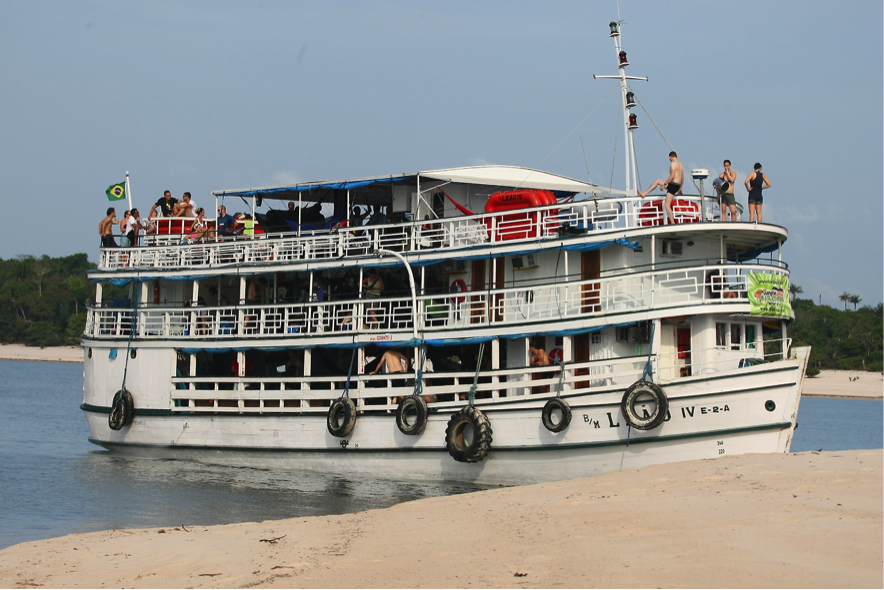On 4 October the countdown to the start of this race will become a reality. I (Sue Hardy) will be stepping into an unknown world of wild animals, extreme heat and swamps trying to get to the finish line 7 days later. Just check my diary – nope had nothing else planned.
The Jungle Marathon is billed as one of the world’s most extreme races – It is a 6 stage 7 day event spanning 256k of steep hills, deep jungle forest and copious water crossings in the Amazon Jungle. An adventure of a life time.
The Jungle Marathon is billed as one of the world’s most extreme races – It is a 6 stage 7 day event spanning 256k of steep hills, deep jungle forest and copious water crossings in the Amazon Jungle. An adventure of a life time.
The cost of an adventure like this was more than I imagined. Apart from the entry fee, which was a staggeringly eye watering amount compared to those events at home, the flights to Santarem were not in a straight line but zigzagged across various local towns scattered through Chile and Brazil and a final taxi ride to our destination of Alter do Chao. Santarem is a town resting on the shores of the Amazonian River and an hour’s taxi ride to the village of Alter do Chao. So with the cost of gear and food mounting up I thought best keep this kind of adventure to a yearly effort at most.
The current temperature in Santarem today is – just checking my weather app – a modest 35◦ with only 70% humidity. That’s nice! What gets to most people who drop a race like this, is the dehydration and heat exhaustion and the complications that come with it. In 2008 two people pulled the pin before they got to the first aid station on the first stage. Not far considering the amount of training and effort to attempt a race like this. Pacing yourself over those 7 days is vital to finishing.
From Alter do Chao we take a boat to the start line along one of the many major tributaries of the Amazon River called Tapajos River. There we enjoy 2 days of Jungle training - topics including what you do when encountering local wildlife, flora and fauna and, of course, our medical and race briefings. There are 3 separate races which make up the Jungle Marathon. The 4 day race of approximately 120k, and actual marathon distance (42k which is stage 4 only) and the full distance of 256k. Each stage has several check points spaced approximately 5 to 10ks apart and each check point is manned by two local Bombeiros (Jungle fireman), two medical staff, two military police and 2 locals. Each stage is a different length starting at a modest 18k for stage 1 to the unthinkable 106k stage 5. Each year the course is different and we have been informed this year will contain “many more” hills than last year – I’m glad I did the Twin Peaks Track and Goat Hill in the Waitakeres a couple of times at least.
Let’s take a break and talk about training for a minute. When I decided that this was the race I wanted to do I had a basic idea of how to train for a marathon but no idea of what I needed to do in order to run a multi stage race in the middle of the jungle. It wasn’t hot here in NZ, training would be middle of winter, we have no jungles – not a great start. That is where James (Kuegler) came to the rescue. He provided a precise programme consisting of runs, walks, tramps both with and without pack, speed sessions, time trials, barefoot runs etc. But best of all was the ability to keep in constant contact with James to ensure I was on the right track. Sessions were monitored, progress noted and lots of coffee was drunk. Without him I would not be here about to leap on a plane and head for wild shores. It has been an invaluable experience.
Now back to our story. At the end of each stage, take your pick of the trees that are left and set up our hammocks, which we have been carrying all this time, prepare a mouth watering delicious meal, which we have been carrying all this time, and settle down to some R&R. That is after, washing socks, undies and getting gear reading for the next day. Race briefing happens once every one finishes for the night and again briefly the next morning in case of changes on the course during the night.
My pack will end up weighing around 12kg and contain all the items I will need for the entire 7 days including food and hammock. Shame I can’t fit in bottle of Merlot and a fillet mignon or two.
Personally the challenge for me will be in my head. There will be many dark moments when I will want to quit and throw in the whole thing and these will be serious moments to overcome. How to get around it? Surround yourself with people so you are not doing this alone. Make sure you have company on the overnight stage, take care of your body and make sure you give it all it needs to make it through. And most of all SUCK IT UP – it’s not a party!!!
We have been very fortunate is securing sponsorship for this event through Macpac who have supported us in a way which we will make us the best dressed athletes to step foot on the start line. They have supplied all our clothes and a lot of our compulsory equipment.
Sue Hardy
The current temperature in Santarem today is – just checking my weather app – a modest 35◦ with only 70% humidity. That’s nice! What gets to most people who drop a race like this, is the dehydration and heat exhaustion and the complications that come with it. In 2008 two people pulled the pin before they got to the first aid station on the first stage. Not far considering the amount of training and effort to attempt a race like this. Pacing yourself over those 7 days is vital to finishing.
From Alter do Chao we take a boat to the start line along one of the many major tributaries of the Amazon River called Tapajos River. There we enjoy 2 days of Jungle training - topics including what you do when encountering local wildlife, flora and fauna and, of course, our medical and race briefings. There are 3 separate races which make up the Jungle Marathon. The 4 day race of approximately 120k, and actual marathon distance (42k which is stage 4 only) and the full distance of 256k. Each stage has several check points spaced approximately 5 to 10ks apart and each check point is manned by two local Bombeiros (Jungle fireman), two medical staff, two military police and 2 locals. Each stage is a different length starting at a modest 18k for stage 1 to the unthinkable 106k stage 5. Each year the course is different and we have been informed this year will contain “many more” hills than last year – I’m glad I did the Twin Peaks Track and Goat Hill in the Waitakeres a couple of times at least.
Let’s take a break and talk about training for a minute. When I decided that this was the race I wanted to do I had a basic idea of how to train for a marathon but no idea of what I needed to do in order to run a multi stage race in the middle of the jungle. It wasn’t hot here in NZ, training would be middle of winter, we have no jungles – not a great start. That is where James (Kuegler) came to the rescue. He provided a precise programme consisting of runs, walks, tramps both with and without pack, speed sessions, time trials, barefoot runs etc. But best of all was the ability to keep in constant contact with James to ensure I was on the right track. Sessions were monitored, progress noted and lots of coffee was drunk. Without him I would not be here about to leap on a plane and head for wild shores. It has been an invaluable experience.
Now back to our story. At the end of each stage, take your pick of the trees that are left and set up our hammocks, which we have been carrying all this time, prepare a mouth watering delicious meal, which we have been carrying all this time, and settle down to some R&R. That is after, washing socks, undies and getting gear reading for the next day. Race briefing happens once every one finishes for the night and again briefly the next morning in case of changes on the course during the night.
My pack will end up weighing around 12kg and contain all the items I will need for the entire 7 days including food and hammock. Shame I can’t fit in bottle of Merlot and a fillet mignon or two.
Personally the challenge for me will be in my head. There will be many dark moments when I will want to quit and throw in the whole thing and these will be serious moments to overcome. How to get around it? Surround yourself with people so you are not doing this alone. Make sure you have company on the overnight stage, take care of your body and make sure you give it all it needs to make it through. And most of all SUCK IT UP – it’s not a party!!!
We have been very fortunate is securing sponsorship for this event through Macpac who have supported us in a way which we will make us the best dressed athletes to step foot on the start line. They have supplied all our clothes and a lot of our compulsory equipment.
Sue Hardy





